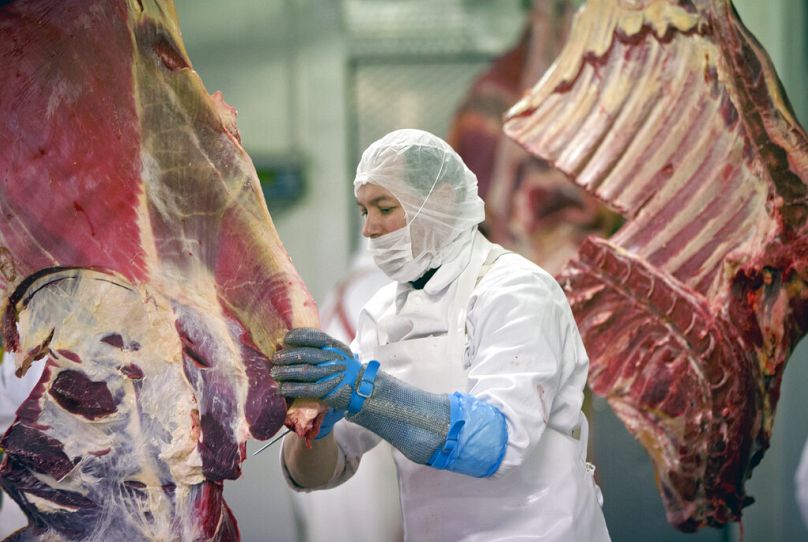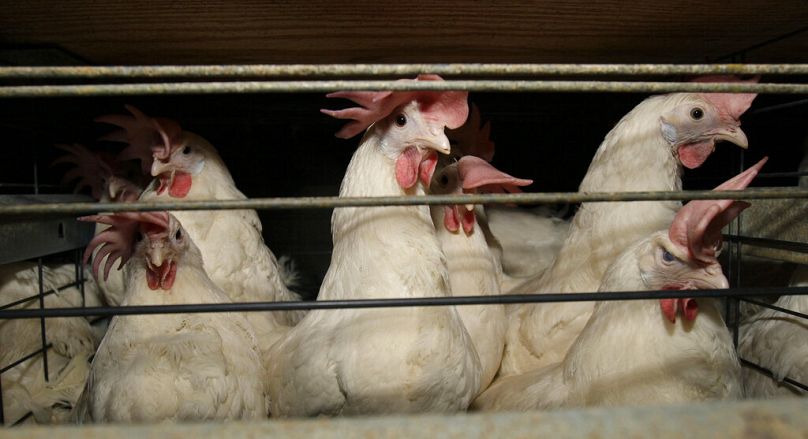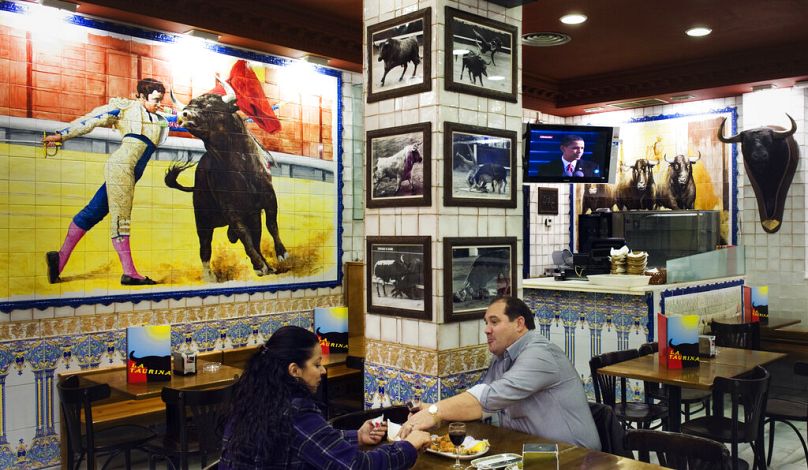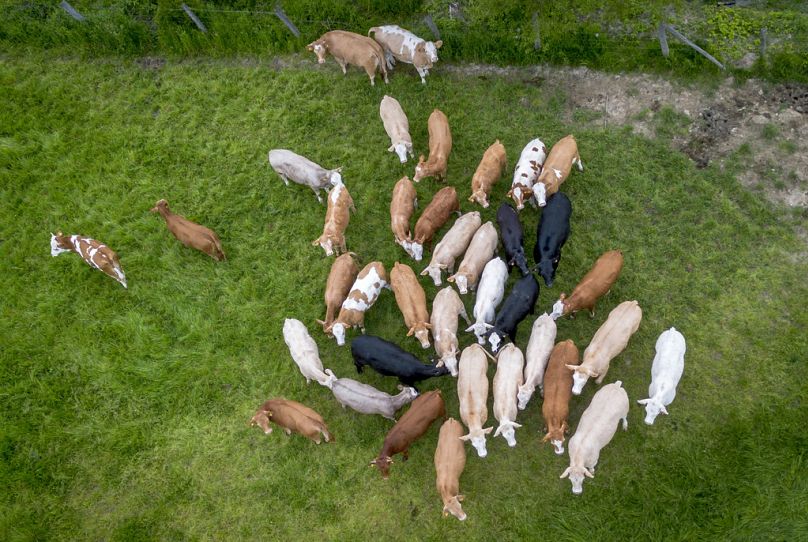Contrary to the popular saying, more bad news about meat production will be good news for people and the planet, Nico Muzi writes.
No news is good news for the meat industry, but it’s terrible news for people and the planet.
Despite the oversized role of livestock production in driving climate change, mainstream media ignores the issue.
A new analysis by Faunalytics for Sentient Media revealed that 93% of climate-related news never mentions meat.
Researchers analysed 1,000 articles in 10 national US media outlets since September 2022 and found that within the very limited coverage that mentions animal agriculture, “much of the reporting covers climate impacts on livestock rather than how meat production is a source of greenhouse gas emissions.”
Earlier research by our sustainable food advocacy group also shows that the topic of climate emissions from animal agriculture gets comparatively less media coverage than other climate problems.
Almost 450 out of 91,180 climate articles in top-tier English-language media outlets in the EU, UK and US between 2020 and mid-2022 mention meat or livestock as a source of emissions — 0.5% of overall climate reporting.
This is problematic: media narratives help to set the political agenda and are precursors to political action.
In other words, media coverage of the role of livestock in driving climate change is more likely to create political urgency, policy prioritisation and resource allocation.
Why are climate and environment reporters ignoring meat’s part in climate change?
For some, it's a question of priorities
At least three main factors contribute to the underreporting of meat’s oversized climate impact by English-language media.
First, a lack of campaigning. Very few civil society groups are campaigning on the link between meat and climate change — compared to the sheer amount of public advocacy around fossil fuels extraction and emissions from cars, trucks, planes and ships.
In part, this corresponds with the minimal climate philanthropy funding going to the food and agriculture sector — 8% of the total known foundation funding dedicated to climate mitigation in 2020.
But it also has to do with a matter of prioritisation. So far, and rightly so, the environmental movement has focused on reducing emissions from the energy systems and transport: two sectors with massive emissions (34% and 15% of total emissions in 2019, respectively) and with technological solutions — solar, wind and electrification of transport — available at scale to decarbonise these industries.
Food is the next frontier in the climate fight: it’s responsible for 37% of global emissions, of which animal agriculture takes the lion’s share.
The sector's size can be a stumbling stone
When presenting the latest IPCC report, Chairperson Hoesung Lee reminded the world that humanity needs to reduce livestock farming to achieve the goal of net-zero emissions by 2050.
We should now expect the attention of civil society (and climate philanthropists) to turn to the transformation of how and what food we produce to feed a growing population without frying the planet.
This is crucial for creating media attention: as Madre Brava’s media analysis shows, investigations by NGOs and studies by think tanks and universities are the leading generators of climate stories around meat and livestock.
The second factor is corporate capture: the continuous attempts by the meat industry to meddle with science and policymaking.
The global meat industry is a huge sector worth $1.3 trillion (€1.16tn) — three times the economic value of the smartphone industry.
People like meat — and telling them not to eat it can turn them hostile
Borrowing heavily from the playbook of the oil industry, media reporting and exposés have shown that big meat processors and dairy corporations use their abundant financial resources to manipulate the facts and sow doubts about climate science on animal products.
For instance, research led by academics at New York University and published in the journal Climate Change show that the 10 largest animal agriculture companies in the US “have contributed to research that minimizes the link between animal agriculture and climate change.”
In terms of lobbying efforts, the same researchers uncovered that “taken as a share of each company’s total revenue over those time periods, Tyson has spent more than double what Exxon has on political campaigns and 21% more on lobbying.”
Recently, the Dublin Declaration of Scientists on the Role of Livestock, a pro-livestock manifesto by scholars with close ties to the meat industry, also appear to further efforts to create a supportive scientific community around livestock and to downplay the impact of meat on climate change.
Also, many people love meat for its taste and for deeply held cultural reasons, which makes the topic contentious for reporting.
As Washington Post columnist Tamar Haspel said when asked about the reasons why animal agriculture gets comparatively less coverage in climate stories than other sources of emissions: "The predominant one is that people like meat and ... basically you end up telling people to eat less beef.”
“And that’s a message that people tend to be hostile to. When we’re talking about fossil fuels, we are giving people an alternative. But when we’re talking about meat, the alternative we give them is very unpalatable to a lot of people.”
Wrong framing can result in polarisation
How can we overcome the underreporting of meat’s role in climate change?
For one, to remove some of the key barriers to more climate coverage on meat production, the media needs a drumbeat of new content, which can be generated with more NGO campaigning and journalistic investigations.
In this regard, it would be impactful if climate and environmental NGOs join forces with animal welfare groups and health experts to amplify messages around the climate, health and animal harms of industrial meat — supported by increased climate philanthropic funding.
Likewise, audacious investigative journalists should dig deeper and unearth new episodes of corporate capture of science and policymaking in this realm.
Second, reworking how to frame narratives and where to place the burden of responsibility is critical in superseding the "contentiousness" of the topic for reporters.
Campaigns — if not framed right — can also create polarisation and fuel culture wars.
The onus of changing how and what food is produced should be on food retailers and governments, not consumers.
Instead of finger-pointing at people for not reducing their meat consumption, the call to action should be to improve the choice context so healthy and sustainable food is the easiest and most affordable option for consumers.
Bad news for some might be good news for people and the planet
Finally, like-for-like alternatives matter when trying to change deeply held cultural habits.
Industry disruptors should deliver more palatable alternative proteins that are as tasty and as cheap as conventional industrial meat to meet consumers where they are in terms of taste and nutritional preferences.
More reporting on the oversized role of livestock in driving climate change will help create political urgency, policy prioritisation and resource allocation.
Contrary to the popular saying, more bad news — about meat production — will be good news for people and the planet.
Nico Muzi is the managing director and co-founder of Madre Brava, a science-based advocacy organisation working to bring in line the food system with the 1.5C climate target.
At Euronews, we believe all views matter. Contact us at view@euronews.com to send pitches or submissions and be part of the conversation.















